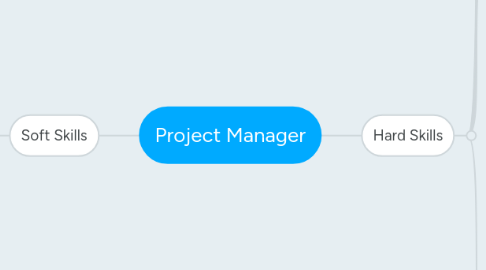
1. Soft Skills
1.1. Conflict Management
1.1.1. Preparation
1.1.2. Negotiation/Intermediation
1.1.3. Problem Solving
1.1.4. Control
1.2. Task Management Skills
1.2.1. Assign right tasks to right people
1.2.2. Delegation
1.2.3. Ability to explain and make task, timeline, result transparant
1.3. Decision making
1.4. Professional culture
1.4.1. Presentation skills
1.4.2. Organizational skills
1.4.3. Ability to initialize, organize, plan and lead conference calls
1.4.4. Knowledge in email and call common decencies
1.5. Communication skills
1.5.1. Group communication skills
1.5.1.1. Communication rules with Team
1.5.1.2. Communication with colleagues within a company
1.5.2. Interpersonal communication skills
1.5.2.1. Communication rules with Service Partner
1.5.2.2. Communication rules with Stakeholders
1.5.2.3. Communication rules with Top Management
1.6. Leadership skills
1.7. Team Leading (HR)
1.7.1. Coaching/Mentoring skills
1.7.2. Team building skills
2. Hard Skills
2.1. Business Correspondance
2.1.1. Knowledge in emailing rules and peculiarities
2.1.2. Documentation
2.2. Project Management Processes
2.2.1. Initiating Process Group
2.2.1.1. Identify all interested parties
2.2.1.2. Identify contact points on different levels
2.2.1.3. Compose initial documentation
2.2.2. Planning Process Group
2.2.2.1. Define communication flow and reporting
2.2.2.2. Define and estimate Scope/ WBS
2.2.2.3. Plan schedule, deliveries
2.2.2.4. Plan Resources
2.2.2.5. Plan quality management
2.2.2.6. Define/Predict risks which may occur, plan risk management
2.2.3. Executing Process Group
2.2.3.1. Manage time/deadlines/timelines
2.2.3.2. Manage score, re-plan change priorities
2.2.3.3. Manage cost
2.2.3.4. Manage quality, change acceptance criteria
2.2.3.5. Manage and avoid risks
2.2.4. Monitoring and Controlling Process Group
2.2.5. Closing Process Group
2.3. Reporting
2.3.1. Different ways of reporting to a client depending on his/her engagement and power
2.3.1.1. Monitor
2.3.1.2. Manage closely
2.3.1.3. Keep informed
2.3.1.4. Keep satisfied
2.3.2. Reporting to Top Managemnet
2.4. Management types and styles
2.4.1. Decision-making Styles
2.4.1.1. Autocratic
2.4.1.2. Consensus
2.4.1.3. Democratic
2.4.1.4. Laissez Faire
2.4.2. Activity Management Styles
2.4.2.1. Directive
2.4.2.2. Bureaucratic
2.4.2.3. Coaching
2.4.2.4. Empowering
2.4.2.5. Facilitating
2.4.2.6. Laissez Faire
2.4.2.7. Supporting
2.4.3. Personal Activity Styles
2.4.3.1. Organizational
2.4.3.2. Charismatic
2.4.3.3. Transformational
2.4.3.4. Referent/Expert
2.5. Set up and Manage project environment within a company
2.5.1. Understanding/Knowledge of company policy and mission
2.5.2. Company organizational structure knowledge
2.6. Knowledge of different project types and their peculiarities
2.6.1. Long/Short- term project
2.6.2. The project sphere: entertainment, finance, marketing, technology-driven
2.6.3. Own product within a company/box (standard solution) / custom-designed / innovative product
2.7. SDLC — Software Development Life Cycle
2.7.1. Waterfall Model
2.7.1.1. Requirements
2.7.1.2. Design
2.7.1.3. Execution/Development
2.7.1.4. Testing
2.7.1.5. Release
2.7.2. V-shaped Model
2.7.2.1. Requirements
2.7.2.1.1. User Software Requrements
2.7.2.1.2. Requirements Specification
2.7.2.2. Design
2.7.2.2.1. High Level Design
2.7.2.2.2. Detailed Design
2.7.2.3. Development
2.7.2.4. QA
2.7.2.4.1. Unit testing
2.7.2.4.2. Integration Testing
2.7.2.4.3. System Testing
2.7.2.4.4. Acceptance testing
2.7.3. Evolutionary Prototyping Model
2.7.3.1. Requirement gathering
2.7.3.2. Analysis
2.7.3.3. Prototype development
2.7.3.4. Client Evaluation
2.7.3.5. Design
2.7.3.6. Coding
2.7.3.7. Integration and testing
2.7.3.8. Maintenance
2.7.4. Spiral Method (SDM)
2.7.4.1. Determine objectives
2.7.4.2. Identify and resolve risks
2.7.4.3. Development and test
2.7.4.3.1. Design
2.7.4.3.2. Coding
2.7.4.3.3. Integration
2.7.4.3.4. Test
2.7.4.3.5. Implementation
2.7.4.3.6. Release
2.7.4.4. Plan the next iteration
2.7.5. Iterative and Incremental Method
2.7.5.1. Agile Development
2.7.5.1.1. Agile Methods
2.7.5.1.2. Agile Manifesto
2.7.5.1.3. Agile Practices
2.7.5.1.4. Agile Roles
2.7.5.2. Cyclic Mini Waterfalls
